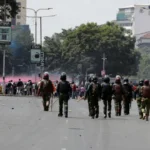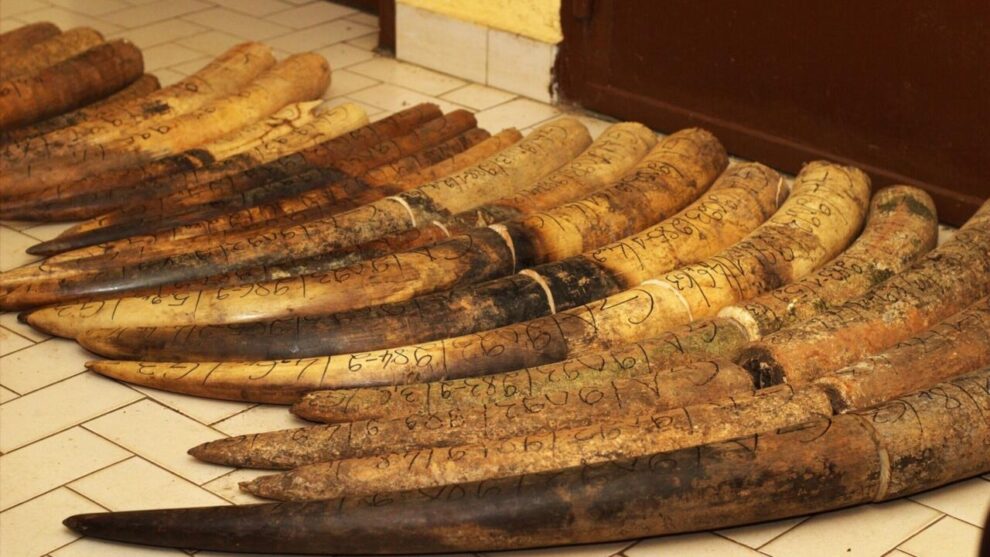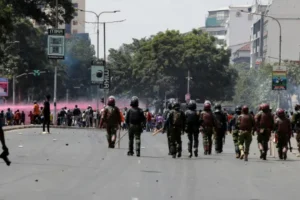Authorities in Gabon have dismantled a broad network of international ivory traffickers who smuggled the prized elephant product from Gabon to Cameroon and on to lucrative Asian markets.
The operation involved the Gabonese judicial police and government directorates of forestry and wildlife, with the support of the NGO Conservation Justice.
In early August, police in the province of Moyen-Ogooué arrested a Gabonese man of Cameroonian origin, along with his wife. A search of their vehicle revealed a cache of 19 tusks and four pieces of ivory, weighing a total of 120kg.
For context, 19 tusks mean at least nine elephants had been killed.
The search also led to the confiscation of several rifle cartridges used for shooting big game, nearly 1 million CFA francs (about 1,500 euros) in cash, illicit substances and an expired residence permit belonging to a well-known Cameroonian ivory trafficker, according to Stephan Ekore Eko, an anti-poaching specialist at Gabon’s Ministry of Water and Forests.
Using fresh information from the suspect, the investigators were able to track down more traffickers. A total of ten people were arrested in separate locations, and nine of them were charged with involvement in “international ivory trafficking”, according to Jean Donald Ulrich Mbadinga, a legal expert with Conservation Justice.
From Africa to Asia
He said it took ten days for the operation to unravel the “vast network of international ivory traffickers in Gabon”.
“The ivory is taken from Gabon, is trafficked across the border to Cameroon, and from Cameroon to Nigeria and from Nigeria to the Asian market,” he said in a video sent to RFI.
He explained that the network functioned like a pyramid: “At the top, there is a leader who resides in Cameroon, and this leader works with collaborators who can be divided into two categories: the poachers’ canvassers and the transporters.”
Canvassers comb the whole of Gabon in search of villagers who can kill elephants, Mbadinga explained. Then when the ivory is available, transporters to go with the canvassers to collect it. The ivory is then transported to Cameroon, he said.

“This type of operation is vital and should be repeated to dismantle the few large ivory trafficking networks that have managed to survive in Gabon, where the political will to protect the environment remains strong,” says Luc Mathot, founding director of Conservation Justice.
Hundreds of tusks seized
In Gabon, trafficking in ivory is punishable by up to ten years in prison. But when it comes to international ivory smuggling, the penalty is heavier: offenders can spend up to 20 years behind bars.
Hundreds of traffickers in Gabon have already met such a fate, according to Ekore Eko.
“Collaboration between Conservation Justice and the Ministry of Water and Forests has led to the arrest of over 500 ivory traffickers. Eighty percent of them have been condemned to prison terms of up to five years,” he said.
“This partnership with the Ministry of Water and Forests led to the seizure of 800 ivory tusks weighing in total 3.5 tonnes.”
That number of tusks could be an indication that at least 200 elephants had been butchered.
Critically endangered species
Despite the risks, the lucrative market in Asia remains tempting for would-be smugglers.
Prices have fallen since China banned the ivory trade in 2017, prompting prices to drop from 208 US dollars per kilo to about 92 dollars/kg by 2020.
But even at that price, the 120 kg seized in the recent operation would still mean that the traffickers would be getting over 11,000 dollars (10,000 euros) on the black market – no small sum in a region where the majority of the people still live below the poverty line.

Preventing poaching is all the more urgent given that Gabon is the world’s largest remaining stronghold of African forest elephants, a species separate from the bush elephants that live on the continent’s savannahs.
While both species are at risk, forest elephants are classified as “critically endangered” on the International Union for Conservation of Nature’s Red List of species in peril, having seen their numbers fall by more than 86 percent over roughly 30 years.
Gabon is home to some 95,000 forest elephants, which represent between 60 and 70 percent of the entire global population, according to a 2021 survey conducted by the Wildlife Conservation Society and Gabon’s National Park Agency.
Source : rfi











